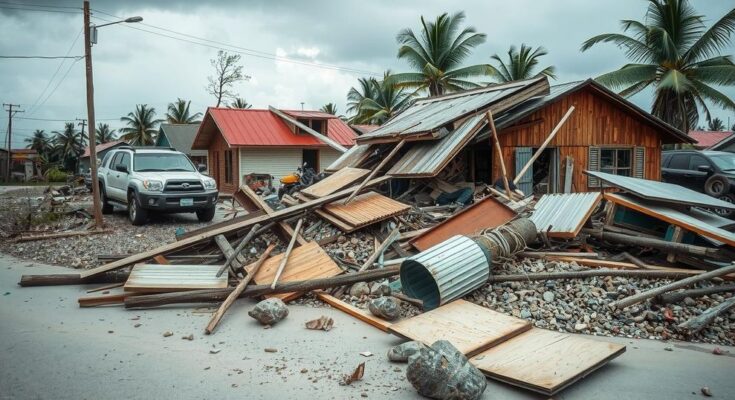Cyclone Chido has devastated Mozambique, resulting in at least 34 deaths, widespread destruction, and the displacement of thousands. The cyclone initially hit Cabo Delgado, causing severe infrastructural damage and now poses ongoing threats in other provinces. The government has called for heightened vigilance and urgent aid to assist affected communities, especially vulnerable children and families.
Cyclone Chido has tragically resulted in at least 34 fatalities and extensive destruction across Mozambique, as reported by the National Institute of Risk and Disaster Management. The cyclone made landfall earlier this week, initially impacting the Cabo Delgado province where the majority of the deaths occurred. Thousands of individuals have been displaced, with significant damage inflicted on infrastructure including homes and roads.
In the aftermath of the cyclone, President Luisa Meque of the National Institute for Disaster Risk Management and Reduction (INGC) confirmed the casualties and urged for increased awareness and vigilance in the provinces of Tete and Niassa, where the cyclone is expected to pass. Although Chido has diminished in intensity, the nation still faces heavy rainfall and strong winds. The President emphasized the necessity for precautionary measures to protect communities.
Currently, reports indicate that nearly 319 individuals have sustained injuries due to the cyclone. The storm was characterized by winds reaching approximately 260 kilometers per hour and heavy rainfall measuring around 250 millimeters within a 24-hour period. Recent assessments indicate that nearly 23,600 homes and 170 fishing vessels were destroyed and that upwards of 175,000 individuals have been impacted.
Chido has been recognized as one of the most devastating cyclones Mozambique has faced in a decade, following its landfall after impacting the Indian Ocean island of Mayotte. Relief efforts are being organized, and reports from the international community express concern for the tens of thousands of children and families at risk due to the storm’s aftermath.
The cyclone has also potentially moved to Malawi and is predicted to weaken near Zimbabwe. Ilaria Manunza from Save the Children has stated, “Cyclone Chido is a catastrophe for children in the north of the country. They risk losing their homes, being separated from their families, and having limited access to water, medical assistance, and education.”
Cyclone Chido is one of the most significant natural disasters to impact Mozambique in recent years, occurring within a region prone to tropical cyclones. The country often faces such extreme weather conditions, which exacerbate existing vulnerabilities due to conflict and underdevelopment. Chido made landfall after affecting Mayotte and has necessitated urgent relief efforts, particularly given the heightened risk to children and families living in affected areas. Historically, Mozambique has struggled with the aftermath of cyclones, often resulting in mass displacement and infrastructural damage, highlighting the ongoing need for disaster preparedness in the region. The response requires coordinated efforts from national agencies and the international community to effectively address the immediate and long-term impacts of such disasters on vulnerable populations.
In conclusion, Cyclone Chido has left a significant toll on Mozambique, resulting in 34 confirmed deaths and widespread damage, particularly in the Cabo Delgado province. The storm has induced vital humanitarian needs, particularly concerning displaced families and children who are at risk of losing essential services. The call for immediate aid and increased awareness underscores the severity of the situation. Continued monitoring and relief efforts are crucial as the cyclone’s aftermath unfolds across different provinces.
Original Source: www.rfi.fr




